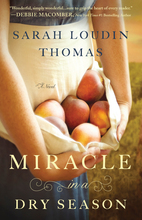 Sarah Loudin Thomas' debut novel focuses on an imperfect community, full of imperfect people, as a drought descends on the Appalachian town. 1954 starts out hopeful for Perla Long, arriving in Wise for an extended visit at her aunt's, with her young, fatherless daughter in tow. She quickly makes the acquaintance of Casewell Phillips, an upstanding bachelor and elder of the church. However, rumors soon fly about her unmarried state, and her hopes about a clean start are quickly dashed. Then, when drought descends, her peculiar gift of making miraculous quantities of food further separates her from the town. Will the community band together, or will it crumble like dust?
Sarah Loudin Thomas' debut novel focuses on an imperfect community, full of imperfect people, as a drought descends on the Appalachian town. 1954 starts out hopeful for Perla Long, arriving in Wise for an extended visit at her aunt's, with her young, fatherless daughter in tow. She quickly makes the acquaintance of Casewell Phillips, an upstanding bachelor and elder of the church. However, rumors soon fly about her unmarried state, and her hopes about a clean start are quickly dashed. Then, when drought descends, her peculiar gift of making miraculous quantities of food further separates her from the town. Will the community band together, or will it crumble like dust?Unlike in most historical fiction I've read, the heroine of this story - Perla - actually takes a backseat to the hero. The majority of the story is told from Casewell's point of view, with Perla filling in only occasionally. Through it, we can really see the changes in Casewell's heart. Though he tries to avoid gossip - a plague that runs rampant in the town - Casewell starts out disappointingly self-righteous and judgmental. He forgets to show mercy and extend God's grace. Then, too, when the preacher admonishes the congregation to repent from their sins, he willingly prays yet can't think of a single thing he has done wrong . . . While it is frustrating to observe his blindness in regards to his own spiritual state, what make it even more difficult is how close it hits home - how easy it is to fall into the same traps as Casewell. However, God works in Casewell's heart, and he becomes a worthy hero; He can do the same for us.
I have a hard time with the notion of judgement that the pastor - again, an imperfect man - promotes. I know it has been very popular (and still is) to see every little bad thing that happens as God's judgment on wrongdoing and sinners. In the Old Testament, God did judge the nations and punish them for wrongdoing. However, since Jesus' death and resurrection, we live in an age of grace. Judgement will come when Jesus comes again, but it has not arrived yet. Until then we live with the earthly consequences of our sin - if we drink and gamble away our money, our families will starve or end up homeless - but it isn't the same as divine punishment of drought or famine for our sins.
Whatever we may think about how a child was conceived, children are a blessing from God; I'm so glad Perla sees her daughter as a blessing and not a damaging mark of shame that others view her to be. I really enjoyed the tale of the Talbot twins; though Casewell and Perla's story is no parallel, they have much to learn from the old ladies. The author drives home several good points on judgement and forgiveness, and most of all she encourages us to examine our own hearts. It is hard to remain dry-eyed through this tender story.
Thank you Bethany House and NetGalley for providing an e-copy for the purpose of review; I was not required to make it positive, and all opinions are my own.
Appalachian Blessings
.5 Appalachian Serenade (novella)
1. Miracle in a Dry Season
2.Until the Harvest
3. The Memory of Drowning
Thank you for the review. I've not read Sarah's book yet. May have to check it out.
ReplyDeleteThanks also for stopping by my blog. It's great to meet you! :)
It's certainly worth a read! And a pleasure meeting you as well!
ReplyDelete